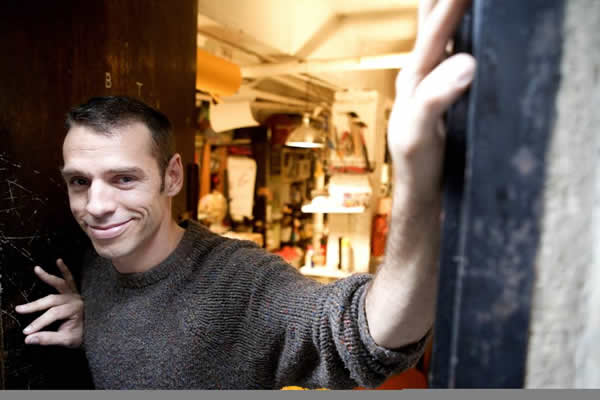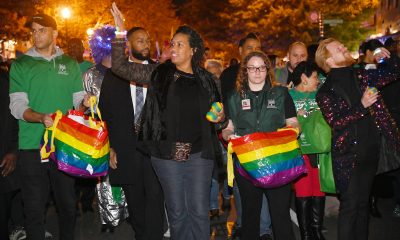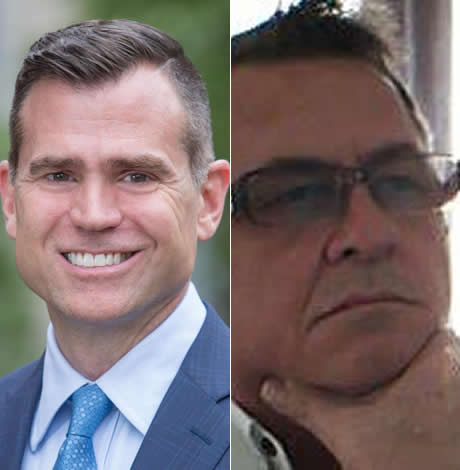Arts & Entertainment
A dash of Basil
Gay puppet innovator dazzles with local run

Basil Twist
‘Petrushka’
March 16-25
Shakespeare Theatre Company
Lansburgh Theatre, 450 7th Street, NW
$22.50-$50
202-547-1122

Puppeteer Basil Twist is having his work exhibited in several D.C. theaters in the coming weeks. (Image courtesy Shakespare Theater Co.)
Basil Twist’s work has been called superhuman, breathtaking and adored — not the usual words used to describe a puppet show. But then, Twist isn’t your usual puppeteer. His sophisticated approach to puppetry melds tradition with innovation and in the process takes the art form to new heights. Throughout March and April, four of his shows can be seen locally as part of “Twist Festival D.C.,” giving area audiences an opportunity to experience his magic.
The mini-fest kicks off at the Shakespeare Theatre Company with “Petrushka,” Twist’s take on the classic Russian ballet about a love triangle involving three puppets: the eponymous clown, a ballerina and a Moor. Originally commissioned for New York’s Lincoln Center in 2000, it’s a puppet show about puppets with music — Russian identical twins Irina and Julia Elkina play a reduction of Igor Stravinsky’s score on identical pianos.
And though he doesn’t perform in the show, Twist selected, trained and directed the unseen puppeteers who animate the 4-foot-tall puppets that he built. “Three puppeteers are required to operate one puppet. For me the puppet is the embodiment of a super human being,” Twist says. “The puppet ballerina soars. She can do things that a human being only wishes she could do.”
A third-generation puppeteer, Twist, who is gay and single, broke onto the scene in 1998 with his underwater, classical musical puppet show “Symphonie Fantastique” (with a festival production at Clarice Smith Performing Arts Center at the University of Maryland in College Park). He credits his training at France’s prestigious École Supérieure Nationale des Arts de la Marionnette with allowing him to think outside the traditional puppet box: “I was taught how puppetry fits into the larger world of art. It’s prompted me to collaborate and think larger and more ambitiously about the place of puppetry in the world.”
The festival’s other two productions are “Arias with a Twist,” his racy and riveting collaboration with New York cabaret and drag performer Joey Arias; and “Dogugaeshi,” a Japanese-inspired journey of images accompanied by original shamisen (Japanese lute) compositions performed by master musician Yumiko Tanaka (at Woolly Mammoth and Studio Theatre respectively).
“A good puppeteer is game, ready and willing to do whatever it takes,” says Twist, 41. “It’s not comfortable: A puppeteer must put his body in weird positions. I’ve tried to use dancers as puppeteers but because they’re so into their own bodies, they have a hard time translating movement into another object. Musicians who play guitar and piano have more success.”
Growing up in San Francisco, Twist played with puppets and made envied Halloween costumes. He loved the Muppets and dreamt of a career in puppetry or animation. He briefly attended Oberlin College where he quickly realized that Ohio undergrad life wasn’t for him. One day at the library he came across a book describing internships at the Center for Puppetry Arts in Atlanta. Instantly he realized, “That’s where I needed to be. It was crystal clear to me.” So Twist left school and moved to New York City, where he still lives. Freshly determined to become a professional puppeteer, he interned in Atlanta and later studied in France. Fortunately for him, “the puppet thing has worked out, because I can’t do anything else.”
Today, the award-winning puppeteer works in a funky Greenwich Village basement studio. And while he considers himself a downtown auteur — a niche he clearly relishes — who does his own puppetry and scenic design projects, Twist isn’t averse to accepting the occasional commercial commission. Recently he traveled to San Paulo, Brazil to tweak his puppets for “The Addams Family Musical” which he created for the original Broadway production. Before heading home, he flew to Rio for Carnival. Of course, Twist says, the party was good and guys were hot, but it was the nightly Samba school competition that impressed him most. “It was like the Super Bowl meets the Oscars meets Burning Man — truly an inspiring experience that I’ll never forget.”
So, can we expect an upcoming show that features hip-shaking, scantily costumed puppets? Maybe someday, but for now, Twist is working on his version of “The Rite of Spring,” another Russian ballet, again with music by Stravinsky.
When creating a new puppet show, Twist says, “I like to think of myself as an audience member. I want to be dazzled. I want it to be very athletic and fast. I want to ask ‘How did they do that?’”
Movies
An ‘Indian Boy’ challenges family tradition in sweet romcom
Refreshing look at what is possible when a family is willing to make changes

For queer audiences hungry for representation, nothing says “I feel seen” quite as much as a good queer romcom.
Perhaps it’s because love stories are universal, differing from culture to culture in the surface dealings only, and therefore have the potential for helping straight audiences understand a different kind of love a little better; or perhaps, in seeing our kind of love displayed so publicly, we feel a sense of validation. Whatever the reason, it rings our bell.
Maybe that’s why the quest for the first “great gay romcom” has continued to be a driving factor in the ongoing history of queer cinema, setting up an expectation in the mainstream that has, perhaps inevitably, fallen short of creating it. Fortunately, there are some efforts that have risen above the pressure to simply be what they are, instead of being the answer to everybody’s prayers for acceptance, and in so doing have managed to come close.
“A Nice Indian Boy” is just that kind of movie. Adapted from a play by Madhuri Sheka (by Eric Randall, whose screenplay made Hollywood’s buzzy “Black List” of un-produced scripts in 2021) and directed by Canadian-born Indian filmmaker Roshah Sethi, it might come closer to presenting an entirely successful gay romcom than most of the other overthought efforts that have come before.
It centers on Naveen (Karan Soni), a 30-something gay doctor, whose South Asian Indian family has long since accepted and supported his orientation but still struggles to reconcile it with their traditional beliefs. Enter Jay (Jonathan Groff), a white freelance photographer who grew up as an adoptee to Indian parents, and of course it’s love at first sight. A whirlwind courtship leads to a proposal, but there are a lot of considerations that must be met before the smitten couple can achieve the “big Indian wedding” of their dreams. The one that looms largest is gaining the approval of Naveen’s progressive-but-devout Hindu parents (Harish Patel and Zarna Garg) – not to mention his discontented sister (Sunita Mani) – whose confusion over his new fiancé’s ethnicity is just one of many obstacles they face in making their dream nuptials a reality. Intensifying that challenge – frequently to comedic effect – is Naveen’s struggle with his own insecurities, which threaten to derail not only the wedding plans but his relationship with the emotionally open and unreservedly passionate Jay, too.
It’s a sweet and clearly heartfelt affair, with a few laugh-out-loud moments to be found, as well as the wry introspection of its neurotic lead character, whose self-questioning turmoils feel like a connecting thread to the work of Woody Allen – indeed, “Annie Hall” is even name-dropped in the film, suggesting a spirit of homage that can be traced in a reflection of that classic Oscar-winner’s title character through Jay’s quirkily unconventional personality.
At the same time, the movie marries its diverse cultural influences by drawing just as heavily from a love of “Bollywood” cinema, and one of its movies in particular, which both of its protagonists adore. That allows it to maintain an aura of lush, larger-than-life romanticism that complements the amusingly endearing self-deprecation of its main protagonist; it also reflects in the movie’s colorful, lively visual aesthetic and its choice to share focus on an entire family of characters for a more sweeping perspective.
As for its handling of the subject of race, despite its clear (and queer) twist on the “Guess Who’s Coming to Dinner?” trope of a family’s surprise over a bi-ethnic romance in its midst, “Indian Boy” doesn’t spend much time worrying about a love connection shared across racial divides; and while it gets considerable comic mileage out of Naveen’s parents’ well-intentioned but clueless efforts to show their acceptance of their gay son, the queerness of his relationship is not really an issue in itself. Rather, the conflict comes – for all of the movie’s primary characters, not just for the couple in the middle – from the difficulty of finding harmony between old customs and a new world that no longer fits within their boundaries.
Admittedly, Sethi’s movie sometimes feels a little too sentimental to be believed; it paints an aspirational picture – a true-love romance between a successful doctor and a rising artist – and tugs even harder on our heartstrings with its depictions of clumsy-but-sincere acceptance from the family around them; and while we don’t want to spoil any surprises, when it comes time for the big finale, it pulls out all the feel-good stops. Cynics in the audience might fail to be as enchanted as it wants them to be.
And yet, it all works wonderfully, largely because of its cast. Soni and Groff have an instantly tangible chemistry, and their differing personalities complement each other perfectly. Individually, they take us with them on their personal journeys with just as much clarity and conviction, and the movie would fall flat without the strength of their performances at its core.
Equally superb, however, are Patel and Garg, whose discomfort over the preparations for their son’s wedding never feel like they come from anywhere but love and a desire to share in his happiness; and Suri, whose considerable comedic talents contrast to great effect with the brewing discord within, lends a much-needed weight to the mix while still managing to glow alongside all her costars.
Combined with the sharp, funny, and insightful script and the generosity of Sethi’s directorial approach, which frames each character with respect and import to the story, it all makes “A Nice Indian Boy” a nice crowd-pleasing movie to see. It may or may not be “the great gay romcom,” and it might all seem a bit too glossy and perfect for some viewers’ taste – but it offers a refreshing look at what is possible when a family is willing to make changes in their way of life simply for the sake of love. What message could be more positive than that?
“A Nice Indian Boy” is now playing in theaters.
a&e features
Tristan Schukraft on keeping queer spaces thriving
New owner of LA’s Abbey expands holdings to Fire Island, Mexico

LOS ANGELES — Like the chatter about Willy Wonka and his Chocolate Factory, the West Hollywood community here started to whisper about the man who was going to be taking over the world-famous Abbey, a landmark in Los Angeles’s queer nightlife scene. Rumors were put to rest when it was announced that entrepreneur Tristan Schukraft would be taking over the legacy created by Abbey founder David Cooley. All eyes are on him.
For those of us who were there for the re-opening of The Abbey, when the torch was officially passed, all qualms about the new regime went away as it was clear the club was in good hands and that the spirit behind the Abbey would forge on. Cher, Ricky Martin, Bianca del Rio, Jean Smart, and many other celebrities rubbed shoulders with veteran patrons, and the evening was magical and a throwback to the nightclub atmosphere pre-COVID.
The much-talked-about purchase of the Abbey was just the beginning for Schukraft. It was also announced that this business impresario was set to purchase the commercial district of Fire Island, as well as projects launching in Mexico and Puerto Rico. What was he up to? Tristan sat down with the Blade to chat about it all.
“We’re at a time right now when the last generation of LGBT entrepreneurs and founders are all in their 60s and they’re retiring. And if somebody doesn’t come in and buy these places, we’re going to lose our queer spaces.”
Tristan wasn’t looking for more projects, but he recounts what happened in Puerto Rico. The Atlantic Beach Hotel was the gay destination spot and the place to party on Sundays, facing the gay beach. A new owner came in and made it a straight hotel, effectively taking away a place of fellowship and history for the queer community. Thankfully, the property is gay again, now branded as the Tryst and part of Schukraft’s portfolio with locations in Puerto Vallarta and Fire Island.
“If that happens with the Abbey and West Hollywood, it’s like Bloomingdale’s in a mall. It’s kind of like a domino effect. So that’s really what it is all about for me at this point. It has become a passion project, and I think now more than ever, it’s really important.”
Tristan is fortifying spaces for the queer community at a time when the current administration is trying to silence the LGBTQ+ community. The timing is not lost on him.
“I thought my mission was important before, and in the last couple of months, it’s become even more important. I don’t know why there’s this effort to erase us from public life, but we’ve always been here. We’re going to continue to be here, and it brings even more energy and motivation for me to make sure the spaces that I have now and even additional venues are protected going in the future.”
The gay community is not always welcoming to fresh faces and new ideas. Schukraft’s takeover of the Abbey and Fire Island has not come without criticism. Who is this man, and how dare he create a monopoly? As Schukraft knows, there will always be mean girls ready to talk. In his eyes, if someone can come in and preserve and advance spaces for the queer community, why would we oppose that?
“I think the community should be really appreciative. We, as a community, now, more than ever, should stand together in solidarity and not pick each other apart.”
As far as the Abbey is concerned, Schukraft is excited about the changes to come. Being a perfectionist, he wants everything to be aligned, clean, and streamlined. There will be changes made to the DJ and dance booth, making way for a long list of celebrity pop-ups and performances. But his promise to the community is that it will continue to be the place to be, a place for the community to come together, for at least another 33 years.
“We’re going to build on the Abbey’s rich heritage as not only a place to go at night and party but a place to go in the afternoon and have lunch. That’s what David Cooley did that no others did before, is he brought the gay bar outside, and I love that.”
Even with talk of a possible decline in West Hollywood’s nightlife, Schukraft maintains that though the industry may have its challenges, especially since COVID, the Abbey and nightlife will continue to thrive and grow.
“I’m really encouraged by all the new ownership in [nightlife] because we need another generation to continue on. I’d be more concerned if everybody was still in their sixties and not letting go.”
In his opinion, apps like Grindr have not killed nightlife.
“Sometimes you like to order out, and sometimes you like to go out, and sometimes you like to order in, right? There’s nothing that really replaces that real human interaction, and more importantly, as we know, a lot of times our family is our friends, they’re our adopted family.
Sometimes you meet them online, but you really meet them going out to bars and meeting like-minded people. At the Abbey, every now and then, there’s that person who’s kind of building up that courage to go inside and has no wingman, doesn’t have any gay friends. So it’s really important that these spaces are fun, to eat, drink, and party. But they’re really important for the next generation to find their true identity and their new family.”
There has also been criticism that West Hollywood has become elitist and not accessible to everyone in the community. Schukraft believes otherwise. West Hollywood is a varied part of queer nightlife as a whole.
“West Hollywood used to be the only gay neighborhood, and now you’ve got Silver Lake and you’ve got parts of Downtown, which is really good because L.A., is a huge place. It’s nice to have different neighborhoods, and each offers its own flavor and personality.”
Staunch in his belief in his many projects, he is not afraid to talk about hot topics in the community, especially as they pertain to the Abbey. As anyone who goes to the Abbey on a busy night can attest to, the crowd is very diverse and inclusive. Some in the community have started to complain that gay bars are no longer for the gay community, but are succumbing to our straight visitors.
Schukraft explains: “We’re a victim of our own success. I think it’s great that we don’t need to hide in the dark shadows or in a hole-in-the-wall gay bar. I’m happy about the acceptance. I started Tryst Hotels, which is the first gay hotel. We’re not hetero-friendly, we’re not gay-friendly. We’re a gay hotel and everyone is welcome. I think as long as we don’t change our behavior or the environment in general at the Abbey, and if you want to party with us, the more than merrier.”
Schukraft’s message to the community?
“These are kind of dangerous times, right? The rights that we fought for are being taken away and are being challenged. We’re trying to be erased from public life. There could be mean girls, but we, as a community, need to stick together and unite, and make sure those protections and our identity aren’t erased. And even though you’re having a drink at a gay bar, and it seems insignificant, you’re supporting gay businesses and places for the next generation.”
Out & About
Celebrate queer pageantry at drag brunch
Babychank Rooftop Bar and Lounge hosts lively gathering

Miss Capital Pride 2024 will host “DC Drag Brunch” on Saturday, April 19 at 12 p.m. at Babychank Rooftop Bar and Lounge.
Organizers promise a lively gathering full of joy, laughter, and connection. Indulge in delicious food and drinks while enjoying performances and entertainment. Tickets cost $27 and can be purchased on Eventbrite.
-

 District of Columbia7 hours ago
District of Columbia7 hours agoWorldPride organizers may warn trans people from abroad not to attend event
-

 Music & Concerts5 days ago
Music & Concerts5 days agoKylie brings ‘Tension’ tour to D.C.
-

 District of Columbia2 days ago
District of Columbia2 days agoLocal officials weighing impact of Trump’s D.C. executive order
-

 South Africa4 days ago
South Africa4 days agoUS-funded South African LGBTQ groups curtail operations








